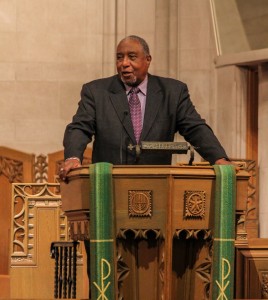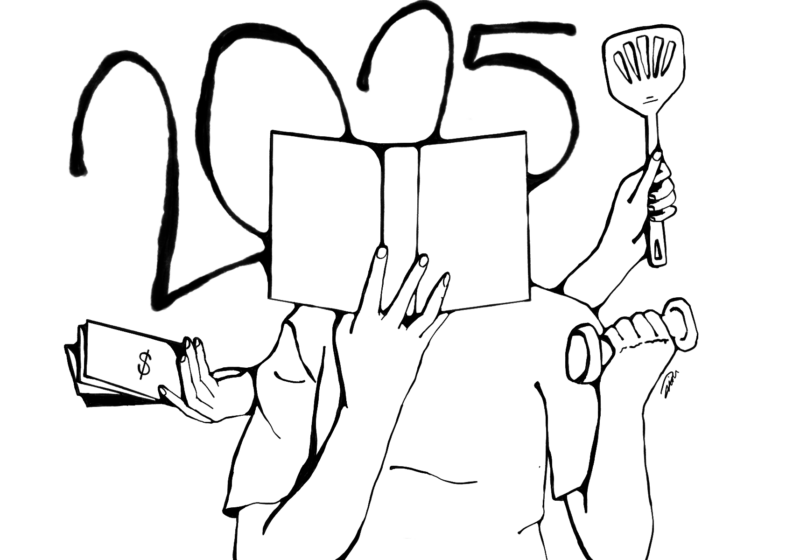 Civil rights activists and contemporaries of Martin Luther King, Jr. Rev. Dr. Bernard LaFayette and his associate Jonathan Lewis, came to Rochester this week for a series of nonviolence training seminars and discussions.
Civil rights activists and contemporaries of Martin Luther King, Jr. Rev. Dr. Bernard LaFayette and his associate Jonathan Lewis, came to Rochester this week for a series of nonviolence training seminars and discussions.
The events are in celebration of the internationally-celebrated Season for Nonviolence, which marks the 64 days between the anniversary of the assassination of Mohandas K. Gandhi and Rev. Dr. Martin Luther King, Jr.
The first event, a talk on nonviolence open to the public and led by LaFayette, took place on Monday, Feb. 17. The next event was a two-day workshop hosted by UR in Wallis Hall in which LaFayette taught Kingian nonviolence strategies to students from a handful of Rochester high schools.
“I think they’re getting a great exposure to an interesting man who’s got a lot to say,” Dean of Admissions Jonathan Burdick said.
The last event of the week will finish Friday and will involve training sessions held by Jonathan Lewis for “youth workers,” or members of the community who are involved with teaching and interacting with young people. Lewis is a “Senior Level Kingian Nonviolence Trainer.”
The high schools involved were Northeast Leadership Academy, Wilson Magnet High School, and Pittsford Mendon High School. These schools all host nonviolence clubs in conjunction with the Gandhi Institute. Student members of these clubs were invited primarily to participate in the trainings.
Director of the Gandhi Institute Kit Miller, who approached UR about its involvement in the Season for Nonviolence, said the students learned several nonviolence strategies in training, including the six principles of Kingian nonviolence, the levels and types of conflict, and self-examination.
The learning process incorporated role-playing and other similar exercises to illustrate real-life situations and give participants an opportunity to practice their knowledge.
The teens participating were provided with campus tours by admissions and given the opportunity to speak with faculty. Burdick discussed the benefit of UR’s involvement with the Rochester high schoolers.
“The earlier we make some kind of relationship with the students […] the more that has an impact on their ability to be prepared for a place like [UR],” Burdick said. He emphasized that providing high schoolers with opportunities to interact with UR creates positive associations with the University and improves its standing in the community.
Burdick said UR would donate its services regardless, but admissions hopes that experiences like those with the Gandhi Institute will spark prospective student interest in other programs at UR that encourage leadership and community involvement.
“[UR is] not seen as this shining city on a hill they can’t get into, it’s a place that’s actually a part of their lives,” Burdick said regarding UR’s interaction with local youth.
UR’s role in hosting LaFayette was in large part funding.
Funds were mostly allocated to paying for housing and travel arrangements for Lafayette and providing catering for participating students.
Miller believes nonviolence training is crucial in not just young people but the general population. She said it leads to not only physical damage but emotional destruction when someone commits an act of violence. Miller also commented on the sustainability of nonviolence when resolving governmental issues.
“We actually can’t afford to continue to blow things up to resolve our issues,” Miller said.
Miller made the distinction that nonviolence also appeals to a wider variety of individuals. Old, young, men, and women can all easily learn nonviolence tactics and employ them, according to Miller.
“You have a way more engaged populace. That’s what happens when you use nonviolence to create social change,” Miller said.
Miller also noted that urban schools need the nonviolence training less than suburban schools.
“We really want to break down the notion that violence is an urban thing,” Miller said.
According to her, no mass shootings have occurred in urban districts, just suburban, and yet city-school students are “made to feel like criminals” when they enter through metal detectors.
LaFayette, 74, was with Dr. Martin Luther King Jr. the day he was assassinated. King actually send LaFayette to Rochester because of the race riots that were happening in 1964, 50 years ago. LaFayette shared how he originally got involved with Kingian tactics.
Commenting on the biblical theme he was brought up on of loving one’s enemy, LaFayette said, “The question is why should I? They do bad to me, so why should I be good to them?”
“It was only when I started learning about nonviolence […] that it started becoming concrete,” LaFayette said. “That gave me an opportunity to put these things together […] it began to be sort of a proposition that you could explore.”




